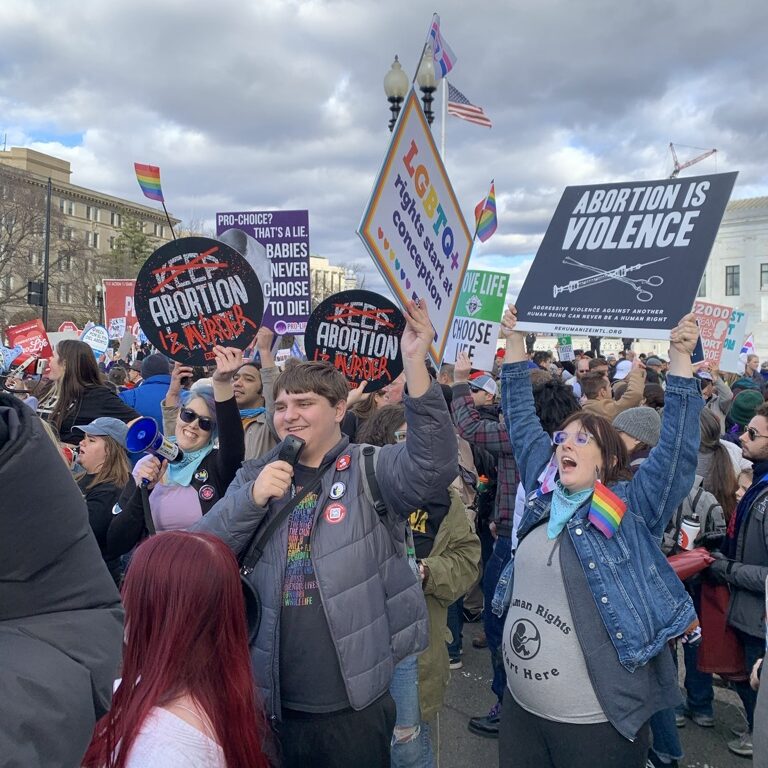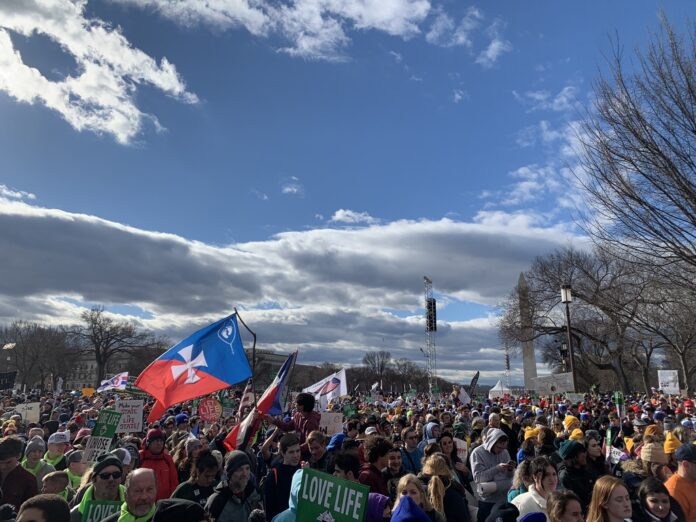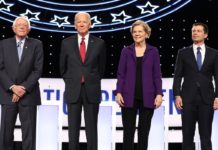![]()
For the first time since the Dobbs decision overturned Roe v. Wade, thousands of pro-life demonstrators descended upon the nation’s capital in the annual March for Life last Friday. This year’s march centered around the need for congressional action to protect the unborn.
Around noon, pro-life demonstrators gathered for a rally on the lawn of the National Mall. The rally featured speakers such as Rep. Steve Scalise, former NFL coach Tony Dungy, and Mississippi Attorney General Lynn Fitch. Each speaker told their story from a different perspective, but the underlying message remained the same—the fight against abortion will not end until “abortion is unthinkable” in the United States of America.
For over an hour, thousands of people stood on the grassy median of the National Mall. Signs, flags, and banners were strewn across the field. At every corner, demonstrators passed out signs to those who arrived empty-handed. One of the most common signs read “I am the post-Roe Generation.” Various groups from around the country—churches, schools and religious advocacy groups—were scattered in small enclaves throughout the crowd.
Matteo Caulfield (CAS ’23), a senior in the College and Co-Director of the Cardinal O’Connor Conference on Life (OCC), attended the march along with other pro-life Georgetown students. Caulfield is a strong advocate for the pro-life movement at Georgetown. His passion for protecting the unborn stems from his personal life. His younger brother, Nico, was adopted from China, and it is through his brother’s story that Caulfield came to terms with the practices of China’s one-child policy, which led to thousands of forced abortions. While this is not the only reason he is an advocate for the unborn, his motivation for the movement is greatly shaped by the strength of his values.
Friday’s march marked the eighth time Caulfield has demonstrated on the Mall. “Every human life deserves dignity from conception to natural death,” Caulfield said. “We have made progress and we have to keep the progress going.”
In his role as Co-Director of the OCC, which was held the day after the march, Caulfield worked to keep the progress moving. “The conference is designed to complement the march,” Caulfield said. “Those who attended the march could join us at Georgetown to add an intellectual backing to the movement.”
Maria Victoria Almeida Vasquez (SFS ’25), also a Co-Director for the OCC, attended Friday’s march along with Caulfield. For Almeida Vasquez, the march was mostly celebratory.
Now that Roe has been overturned, the movement is increasingly focusing on the support systems needed as an alternative to abortion. “The pro-life movement focuses on how we can support women after birth and during pregnancy,” Almeida Vasquez said. “The pro-life movement is not just conservatives. Being pro-life does not put you in any box.”
Indeed, the rally appeared to bring together people with normally opposing opinions. There were pride flags, crosses and a few “Let’s Go Brandon” flags at the march. Unlike other public demonstrations, however, the people carrying these symbols were all on the same side, even if only for this particular issue.
This is not to say that the rally was without its flaws. The event was not a conservative Republican rally, but at some points, it felt like it was. Some of the speakers did not hesitate to attack congressional Democrats. This gave many in the crowd a feeling of uneasiness. Muffled groans in response to partisan comments were common at the march.
Rep. Steve Scalise, while promoting Republican bills, blamed former Speaker Nancy Pelosi for blocking crucial pro-life legislation. Reverend Franklin Graham, CEO of the Billy Graham Evangelistic Association, brought politics directly into his prayer. As he prayed, he thanked God for former President Donald Trump, former Vice President Mike Pence and Mitch McConnell, to the dismay of many.
Following the rally, thousands of demonstrators marched past the Capitol to the Supreme Court. In the center of the crowd stood a group of roughly twenty demonstrators who stood out from the rest.
At the front of the group, someone held a sign which read “LGBTQ+ rights start at conception.” The pro-life movement is traditionally conservative, but the involvement of members of the LGBTQ+ community is a signal that the pro-life movement may be expanding to include more voices. At the same time, it is characteristic of a movement that is still trying to grapple with its identity.

Among those at the march, many were from outside of Washington. Some traveled long distances. Alejandro Macias and Angelie Clark, two millennials in attendance, made the trip to DC from Las Vegas, Nevada.
When asked why he traveled to DC, Macias emphasized the importance of showing public support for the pro-life movement. “Now that Roe v. Wade has been overturned, the work has just begun,” Macias said.
Clark also expressed her desire to continue the work of the pro-life movement. “I think it’s so important, especially this year now that this is the first March for Life since Roe v. Wade has been overturned, to show a huge presence to the United States and the world that we are a united front,” Clark said.
Like many at the march, Clark emphasized the importance of ensuring equality amongst all in society. “I’m pro-life because I believe all human life deserves a right to exist,” she said.
In the big picture, despite the sometimes political feel of the March for Life, supporting women was a strong theme. Clark, when asked why she is pro-life, gave a clear answer. She said, “women deserve better than abortion.”
The March for Life showed no signs of stopping. It is questionable, however, whether the movement as a whole will truly move beyond partisan politics. Only time will tell. Nonetheless, each person interviewed expressed hope that the pro-life movement will always stay true to its values—that is, supporting the strong and inspiring women who lie at the heart of this issue.












